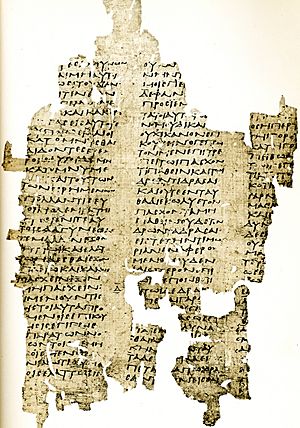Sophistic works of Antiphon facts for kids
Antiphon the Sophist was a Greek writer who lived in Athens around the late 400s BC. He wrote several important books, or "treatises," but we don't know much about his life.
For a long time, people have wondered if Antiphon the Sophist was the same person as another famous Greek, Antiphon the Orator. The Orator was known for his speeches and for being involved in politics. Scholars still debate this today. Some believe they were the same person, while others think they were two different individuals.
One of his most important writings was called On Truth. Only parts of it still exist, but they cover many topics, from space and math to ideas about right and wrong. Other writings, like On Concord and Politicus, also have surviving pieces. It's also not fully clear if a book called Interpretation of Dreams was written by Antiphon the Sophist or someone else with the same name.
Antiphon's Ideas on Truth
The book On Truth is very important for understanding ideas about how societies should work. It seems to be an early version of what we now call "natural rights." This means the idea that people have certain rights just because they are human, not because a law gives them those rights.
The ideas in On Truth suggest that its author believed in strong ideas of equality and freedom for everyone. These ideas fit well with a democracy, where people have a say in their government. However, they are very different from the views of someone who supported an oligarchy, which is when a small group of people holds all the power. Antiphon the Orator was involved in a group that tried to overthrow democracy in 411 BC. Because of this, many scholars believe the Sophist and the Orator must have been different people.
Some parts of On Truth show Antiphon the Sophist's strong belief in freedom.
Nature and Freedom
In On Truth, Antiphon compares the rules and laws made by people (called nomos) with "nature" (called physis). He believed that nature, especially human nature, wants people to be free and spontaneous. He felt that many laws and rules put limits on people that were not natural or needed.
He wrote: "Most of the things which are legally just are... unfriendly to nature. By law it has been laid down for the eyes what they should see and what they should not see; for the ears what they should hear and they should not hear; for the tongue what it should speak, and what it should not speak; for the hands what they should do and what they should not do... and for the mind what it should desire, and what it should not desire."
Antiphon thought that being controlled or limited causes pain. He believed that it is natural for humans to avoid pain.
He also wrote: "Life is like a brief vigil, and the duration of life like a single day, as it were, in which having lifted our eyes to the light we give place to other who succeed us." This suggests that since death is natural, we should not make life painful. Antiphon believed that people should be free from anything that harms their individual spirit. It is said that Antiphon even set up a place in the public market where he would comfort people who had lost loved ones.
Antiphon's support for the natural freedom and equality of all people was very advanced for his time. His ideas were similar to those of later thinkers like John Locke, who wrote about natural rights, and the ideas found in the American Declaration of Independence.
Antiphon's Mathematics
Antiphon was also a skilled mathematician. Along with his friend Bryson of Heraclea, he was one of the first to find a way to estimate the value of pi. Pi is a number used to calculate the size of circles. They did this by drawing polygons (shapes with straight sides) inside and outside a circle. Then they calculated the areas of these polygons to get a range for pi's value. This method was also used to try and solve the problem of "squaring the circle." This is an old math problem about drawing a square with the same area as a given circle, using only a compass and straightedge.
See also
 In Spanish: Antifonte de Atenas para niños
In Spanish: Antifonte de Atenas para niños
 | John T. Biggers |
 | Thomas Blackshear |
 | Mark Bradford |
 | Beverly Buchanan |


